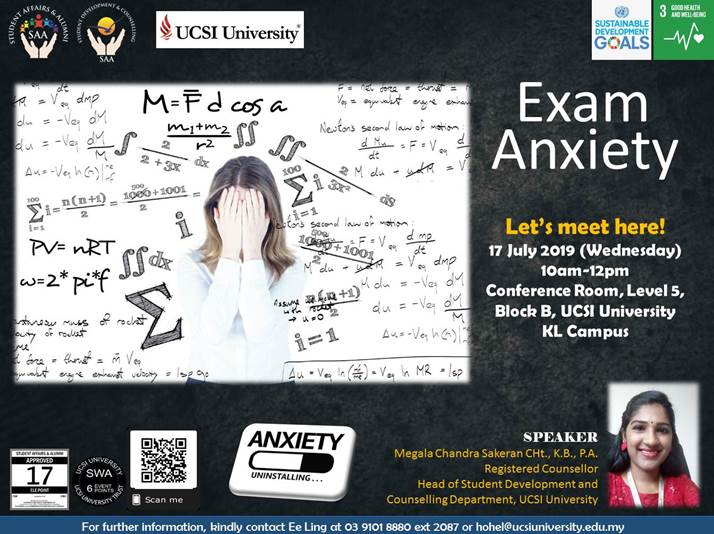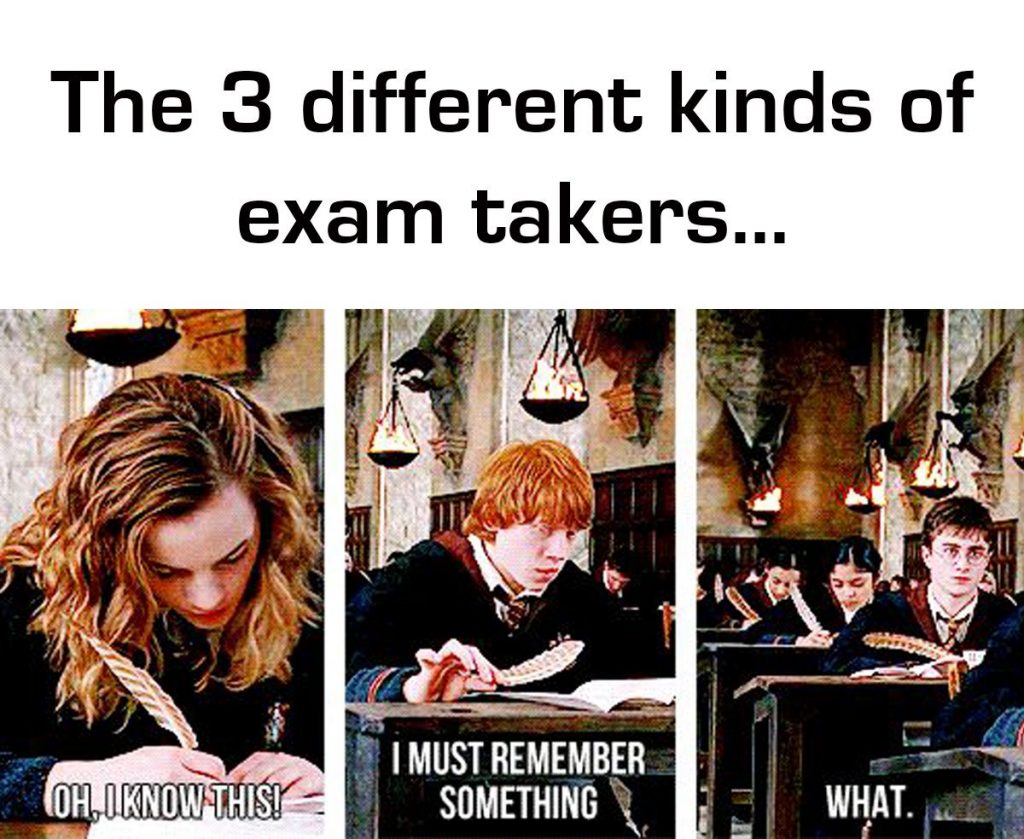Exam Anxiety

On the last 17 July 2019, a talk on exam anxiety was held at the Conference Room, Level 5, Block B, UCSI University, KL campus. The talk was given by Megala Chandra Sakeran, a registered counsellor and also the Head of Student Development and Counselling Department of UCSI University.
After a 5-minute ice breaking session, Megala started the talk by posing a question to the audience. She asked, “What does exams mean to you?”
In short, there are two kinds of emotions that an exam invokes in a person:
1. Distress: great pain, anxiety, or sorrow; acute physical or mental suffering; affliction; trouble. Most students usually fall under this category. Examinations have always invoked anxiety in many students. This happens when there exist bad consequences for a poor performance, or when one equates their performance with their own self-worth.
2. Eustress: stress that is deemed healthful or giving one feeling of fulfilment. This happens when a student treats an exam as a chance to test their knowledge or show their potential. When met with failure, they take it as a learning experience.
On a related note, the kinds of emotion you feel during an exam relate closely to the type of exam taker you are.

So, what causes exam anxiety? After some discussion, we found several factors that cause exam anxiety:
1. Poor study habits: There are some students that take it easy and leave studying to the last minute. One week’s worth of studying compared to studying throughout the semester will definitely make you feel unprepared. Besides, burning the midnight oil has proven to make you perform worse than getting a good night’s rest.
2. Low CGPA: Students with a low CGPA will definitely stress out during exam period because they want to achieve a good grade. Achieving a bad grade may mean that you fail the course and have to retake it next semester. For students who were tight on finances, a low CGPA puts a risk on their scholarship too.
3. Low confidence: A student with low confidence may think that they will not do well on the exam and overcompensate by studying too much. This will make them feel a constant state of stress and anxiety over their performance.
4. Poor time management: Besides exams, students also have to complete their assignments, attend co-curricular activities, socialise with their friends or even work part time. A student with poor time management will be unable to juggle all these effectively. Moreover, some students have poor time allocation during the exam itself. They may allocate too much time for one question and leave too little for the rest.
5. Unrealistic expectations or Perfectionism: Your own expectations also causes exam anxiety. Sometimes, you many expect too much from yourself due to perfectionism, a fear of failure or it may even be that you base your self-worth or intelligence on your performance on the exam.

Hence, after identifying the factors that cause exam anxiety, we can determine the ways to overcome exam anxiety:
1. Good study habits: Always prepare early for an exam. If your exam is two weeks away, it may be best to start your revision now. Dedicate a certain amount of time for revision each day and make sure you hit your target every day. However, be careful not to burnout by taking care of your mental health too. Besides, make sure to keep yourself at full physical health and get a good night’s sleep.
2. Be proactive: Look for past year questions from your teachers or seniors in order to spot the possible questions that might appear on the exam. This helps to narrow down your scope of study and lessen your workload. Also, always be willing to ask for help from your teachers or even your peers.
3. Minimize distractions: Try to minimize your distractions such as social media and mobile games. This also includes creating an optimal learning environment for yourself in order to increase your efficiency. If your home is not an optimal learning environment for you, go to the library or a café instead.
4. Determine your learning style: For this part, the audience were required to fill in a “VAK Learning Styles Self-Assessment Questionnaire” in order to determine our learning style. Based on the questionnaire, the VAK learning styles model suggests that most people can be divided into three preferred styles of learning, which are:
a) Visual
A person with a Visual learning style has a preference for seen or observed things, including pictures, diagrams, demonstrations, displays, handouts, films, flip-chart, and such. These people will use phrases such as ‘show me’, ‘let’s have a look at that’ and will be best able to perform a new task after reading the instructions or watching someone else do it first. These are the people who will work from lists and written directions and instructions.
b) Auditory
A person with an Auditory learning style has a preference for the transfer of information through listening: to the spoken word, of self or others, of sounds and noises. These people will use phrases such as ‘tell me’, ‘let’s talk it over’ and will be best able to perform a new task after listening to instructions from an expert. These are the people who are happy being given spoken instructions over the telephone, and can remember all the words to songs that they hear.
c) Kinaesthetic
A person with a Kinaesthetic learning style has a preference for physical experience such as touching, feeling, holding, doing and practical hands-on experiences. These people will use phrases such as ‘let me try’, ‘how do you feel?’ and will be best able to perform a new task by going ahead and trying it out, learning as they go. These are the people who like to experiment, hands-on, and never look at the instructions first.
So, why is it important to find out our learning style? This is because each person commonly has a main preferred learning style. Some people have a very strong preference; other people have a more even mixture of two or less commonly, three styles. When you know your preferred learning style, you will understand the type of learning that best suits you. This enables you to take the appropriate steps in your learning in order to learn better, which can reduce your exam anxiety.
For information about learning styles, personality, and personal development, go to www.businessballs.com
Lastly, Miss Megala ended the talk by encouraging the students that face difficulties in their studies to contact the counselling department. Here are the ways to get in touch with the school counsellors:
- E-counselling through the IIS system
- Send an email to [email protected]
- Walk in at SAA, Level 9, Block G, UCSI University
- Contact them through the SDCD Facebook page: UCSI Student Department & Counselling Department
In conclusion, exam anxiety is a common problem faced by all students, regardless of the type of student you are. However, it is how you think of it that really matters. The purpose of examinations is to test your knowledge; they are not representative of your intelligence or self-worth. If your exam performance is truly important in other ways, then make sure you adopt good study habits and be proactive in order to enhance your learning. At the end of the day, examinations are just a small hurdle in your life, so just take them as a learning experience.
